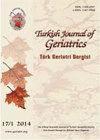The Effect of Fear of COVID-19 and Social Isolation on the Fragility in the Elderly
IF 0.3
4区 医学
Q4 GERIATRICS & GERONTOLOGY
Turkish Journal of Geriatrics-Turk Geriatri Dergisi
Pub Date : 2021-03-29
DOI:10.31086/TJGERI.2021.196
引用次数: 3
Abstract
Introduction: The most important matter on which a consensus is built about COVID-19 disease is that the elderly are one of the most vulnerable risk groups In this study, we aimed to evaluate the impact of the COVID-19 pandemic on the fragility of the elderly Materials and Methods: The study is a cross-sectional study conducted at the end of the sixth month of the pandemic Our study included 319 elderly individuals The elderly individuals were reached at the primary level health centers "FRAIL Frailty Scale" and "Coronavirus Fear Scale" were used in the evaluation Results: The results showed that 72 4% of the elderly population could not comply with the routine health checks and chronic complaints increased to 39 3% during social isolation In the first six-month period of the pandemic, it was found that the prefrail and fragile elderly population increase by 4 7% and 6 6%, respectively The fragility risk increased by 1 03 times (OR:1 001-1 007) as COVID-19 fear increased, while 2 2 times (OR:1 23-3 94) in those with diabetes, 1 88 times (OR:1 01-3 49) in those with cardiovascular diseases, and 2 15 times (OR:1 07-4 34) in those who postponed their routine health checks Conclusion: Early stage results of social isolation measures taken for the elderly within the scope of the pandemic indicated that fear of coronavirus infection increased fragility among the elderly Elderly health evaluations should continue in the further stages of the pandemicCOVID-19恐惧和社会隔离对老年人脆弱性的影响
关于COVID-19疾病建立共识的最重要的事情是老年人是最脆弱的风险群体之一。本研究旨在评估COVID-19大流行对老年人脆弱性的影响。本研究是一项横断面研究,在大流行的第六个月结束时进行,我们的研究对象是319名老年人,老年人在基层卫生中心进行评估,评估使用“虚弱虚弱量表”和“冠状病毒恐惧量表”。结果:结果显示,在社会隔离期间,72 4%的老年人群不能遵守常规健康检查,慢性疾病投诉增加到39 3%。在大流行的前6个月,发现虚弱和脆弱的老年人群分别增加了4.7%和6%,随着COVID-19恐惧的增加,脆弱性风险增加了1 03倍(OR:1 001-1 007),糖尿病患者脆弱性风险增加了22倍(OR:1 23-3 94)。结论:大流行范围内对老年人采取社会隔离措施的早期结果表明,对冠状病毒感染的恐惧增加了老年人的脆弱性,在大流行的后续阶段应继续进行老年人健康评估
本文章由计算机程序翻译,如有差异,请以英文原文为准。
求助全文
约1分钟内获得全文
求助全文
来源期刊

Turkish Journal of Geriatrics-Turk Geriatri Dergisi
GERIATRICS & GERONTOLOGY-
CiteScore
0.60
自引率
0.00%
发文量
46
审稿时长
6-12 weeks
期刊介绍:
Turkish Journal of Geriatrics is a peer-reviewed journal. Official language of the journal is English. Turkish Journal of Geriatrics invites submission of Original Articles based on clinical and laboratory studies. Review Articles are published only after the invitation from the Editorial Board.
 求助内容:
求助内容: 应助结果提醒方式:
应助结果提醒方式:


